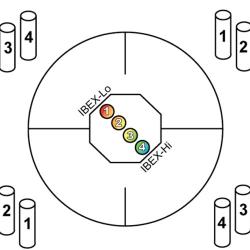Source Institutions
Source Institutions
Add to list Go to activity
Activity link broken? See if it's at the internet archive

By tossing, collecting, and sorting beanbags, learners understand how the IBEX spacecraft uses its sensors to detect and map the locations of particle types in the interstellar boundary. Learners model the collection of particles called Energetic Neutral Atoms (ENAs) by the Interstellar Boundary Explorer (IBEX). If you need an audio version of this material, the file is compatible with screen reading software such as Adobe Acrobat Reader.
- 10 to 30 minutes
- 30 to 45 minutes
- Over $20 per group of students
- Ages 11 - 18
- Activity, Lesson/Lesson Plan, Model
- English
Quick Guide
Materials List (per group of students)
- 4 medium-sized buckets/boxes painted or covered with colored paper and numbered as indicated in the Set-up Diagram (p2 of PDF)
- 2 pieces of stiff cardboard or lids to cover the buckets when not in use
- 50-100 small beanbags (red, orange, yellow, green and blue), a cheaper alternative may be balloons filled with sand or rice.
- masking tape
- IBEX spacecraft poster or picture
- 16 clear tubes or cylinders (e.g. graduated cylinders) that are big enough in width to accommodate the beanbags numbered as in the diagram
- an area at least 10ʼx10ʼ
Subjects
-
Earth and Space Science
-
Astronomy
- Probes, Satellites and Spacecraft
- Solar System
-
Astronomy
-
Engineering and Technology
-
Technology
- Information and Communication
-
Technology
-
Mathematics
-
Data Analysis and Probability
- Data Collection
- Data Representation
-
Data Analysis and Probability
-
Physical Sciences
- Energy
-
Structure and Properties of Matter
- Elementary Particles and Nuclear Physics
-
The Nature of Science
-
The Scientific Process
- Gathering Data
-
The Scientific Process
-
The Nature of Technology
-
Technology and Society
- Impacts of Technology
-
Technology and Society
Informal Categories
- Physical Activity
Audience
To use this activity, learners need to:
- see
- see color
- be mobile
- touch
Learning styles supported:
- Involves teamwork and communication skills
- Involves hands-on or lab activities
Other
Includes assesments for student learning:
This resource is part of:
Access Rights:
- Free access
By:
Rights:
- All rights reserved, NASA,
Funding Source:
- NASA
